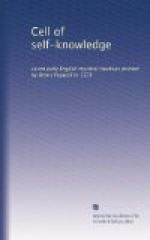holy Church useth. This is good, and of the gift
of God, for the substance of this feeling lies in
the love of Jesu, which is fed and lightened[179] by
such manner of songs. Nevertheless, in this manner
of feeling, a soul may be deceived by vain glory;
not in that time that the affection singeth to Jesu,
and loveth Jesu in sweetness of Him, but afterward,
when it ceaseth and the heart keeleth[180] of the love
of Jesu, then entereth in vain glory. Also some
man is deceived on this wise: he heareth well
say that it is good to have Jesu in his mind, or any
other good word of God; then he straineth his heart
mightily to that name, and by a custom he hath it
nearhand alway in his mind; and, nevertheless, he
feeleth not thereby in his affection sweetness, nor
light of knowing in his reason, but only a naked mind
of God,[181] or of Jesu, or of Mary, or of any other
good word. Here may be deceit, not for it is
evil for to have Jesu in mind on this wish but if
he this feeling and this mind, that is only his own
working by custom, hold it a special visitation of
our Lord,[182] and think it more than it is.
For wete thou well that a naked mind or a naked imagination
of Jesu, or of any ghostly thing, without sweetness
of love in the affection, or without light of knowing
in reason, it is but a blindness, and a way to deceit,
if a man hold it in his own sight more than it is.
Therefore I hold it siker[183] that he be meek in
his own feeling, and hold this mind in regard nought,
till he may, by custom and using of this mind, feel
the fire of love in his affection, and the light of
knowing in his reason. Lo, I have told thee in
this matter a little, as me thinketh; not affirming
that this sufficeth, nor that this is the soothfastness
in this matter. But if thou think it otherwise,
or else any other man savour by grace the contrary
hereto, I leave this saying, and give stead to him;
it sufficeth to me for to live in truth[184] principally,
and not in feeling.
EXPLICIT
V.
HERE AFTER FOLLOWETH A DEVOUT TREATISE CALLED THE EPISTLE OF PRAYER
Ghostly friend in God, as touching thine asking
of me, how thou shalt rule thine heart in the time
of thy prayer, I answer unto thee thus feebly as I
can. And I say that me thinketh that it should
be full speedful unto thee at the first beginning
of thy prayer, what prayer so ever it be, long or
short, for to make it full known unto thine heart,
without any feigning, that thou shalt die at the end
of thy prayer.[185] And wete thou well that this is
no feigned thought that I tell thee, and see why;
for truly there is no man living in this life that
dare take upon him to say the contrary: that is
to say, that thou shalt live longer than thy prayer
is in doing. And, therefore, thou mayst think
it safely, and I counsel thee to do it. For,
if thou do it, thou shalt see that, what for the general
sight that thou hast of thy wretchedness, and this
special sight of the shortness of time of amendment,
it shall bring in to thine heart a very working of
dread.




